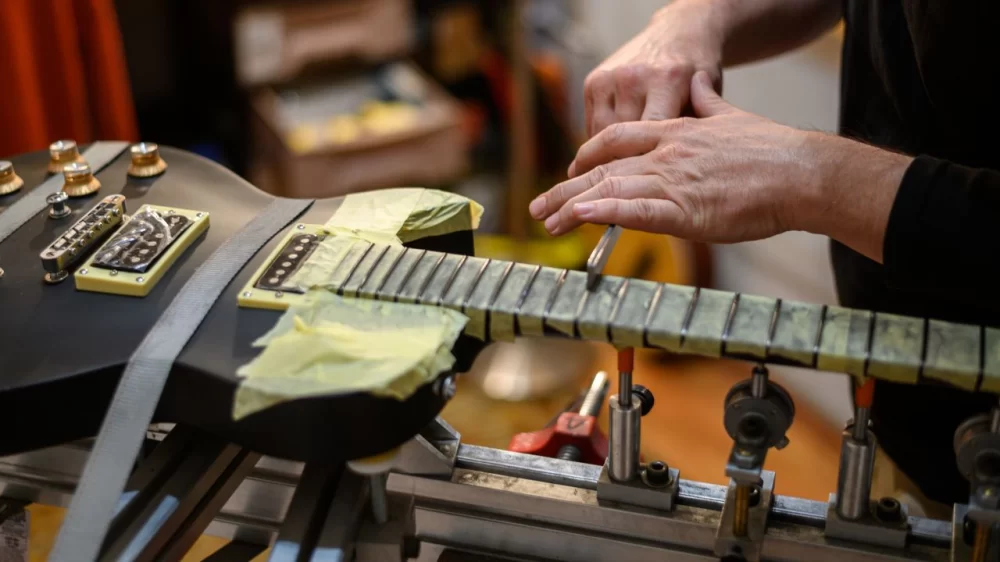
Why Regular Electric Guitar Maintenance Is Essential
As a guitarist, I can’t stress enough how important it is to take care of your electric guitar. Not only does proper maintenance extend the life of your instrument, but it also ensures that you continue to get the best sound possible. When I first started playing, I didn't think much about guitar care – I was more focused on learning songs. However, after a few months, I noticed my tone wasn’t as sharp, and my guitar started to feel less responsive. That’s when I realized the importance of taking care of it.
Just like any other musical instrument, an electric guitar requires some attention to maintain its quality. Whether you’re a beginner or a seasoned player, understanding how to care for your guitar can prevent costly repairs down the road. Over the years, I've picked up a lot of tips and tricks that I now swear by, and today, I’m excited to share them with you!
1. Clean Your Electric Guitar Regularly
One of the simplest yet most effective ways to keep your electric guitar in top condition is by cleaning it regularly. Dust, grime, and sweat can build up over time, which can affect the tone and playability. Every guitarist has their preferred cleaning routine, but here's what I’ve found works best:
Body and Neck Cleaning: I always start by wiping down the body and neck of my guitar with a soft microfiber cloth. A cloth specifically designed for cleaning guitars works best, as it won't scratch the finish. If you notice any stubborn spots or sticky residue, I recommend using a specialized guitar cleaner or polish. These products are gentle yet effective at lifting dirt without damaging the finish.
Fretboard Cleaning: The fretboard is an area that can accumulate dirt quickly, especially if you play a lot. I’ve learned that using fretboard oil can really help preserve the wood and keep it from drying out. I use lemon oil or a dedicated fretboard cleaner every few months. Remember, never overuse these products, as too much oil can leave a sticky residue behind.
2. Change Your Strings Regularly
Another essential part of electric guitar maintenance is string care. Strings are the heart of your guitar's sound, so it’s crucial to replace them regularly. As a rule of thumb, I change my strings every 3-4 weeks, depending on how often I play. If you play daily, you may need to change them even more frequently.
When I first started, I used to wait until a string broke to replace it, but I quickly learned that waiting that long isn’t ideal. Fresh strings give your guitar a brighter, more vibrant tone. Plus, when you have new strings, your tuning stability improves significantly, and the guitar just feels more responsive.
Tip: You don’t always need to replace all six strings at once. If only one string is starting to lose its tension or sound quality, simply replace that one. This can help save time and money in the long run!
3. Keep Your Guitar Properly Tuned
As a guitarist, tuning is something that I never overlook. Not only does it make sure that your guitar sounds great, but it also ensures that your neck and hardware remain in proper alignment. An out-of-tune guitar can cause unnecessary stress on the neck, which might lead to issues like warping over time.
I personally recommend using a tuner for the best accuracy. You can find clip-on tuners, pedal tuners, or even apps for your smartphone. The more accurate your tuning is, the better your guitar will sound overall. And always make sure your guitar is in tune before each session – I make it a habit to tune my guitar every time I pick it up.
4. Store Your Guitar in the Right Environment
The way you store your guitar can make a huge difference in its longevity. I used to leave my guitar out of its case, but then I noticed it was starting to get a bit out of shape. Humidity and temperature changes can cause damage to the wood, so I learned that keeping my guitar in a case when not in use is a smart move. If you live in an area with extreme temperatures, consider investing in a humidity-controlled guitar case or room humidifier to maintain optimal conditions for your instrument.
5. Regularly Check the Electronics
The electronics on an electric guitar – including the pickups, pots (potentiometers), and switches – can wear out over time. I’ve had my fair share of crackling pots and faulty switches, and let me tell you, it can be frustrating when your guitar stops working properly during a gig. To avoid this, I recommend checking your electronics regularly. If you notice any crackling or inconsistent sound, it’s time to clean or replace the components.
Tip: Always make sure your guitar is unplugged when checking or adjusting the electronics to avoid any accidents. If you’re not familiar with guitar electronics, it’s best to take your guitar to a professional technician to have it checked out.
6. Protect Your Guitar from Accidental Damage
Accidents happen, but we can do our best to prevent them. After one too many close calls, I started taking extra precautions to ensure my guitar stays safe. I use a padded gig bag or hard case when transporting my guitar. This way, I don’t have to worry about bumps, knocks, or potential falls that could cause serious damage.
Tip: Always be mindful of where you place your guitar. I’ve had a few close calls where I almost knocked it over because I wasn’t paying attention to where I put it down. A guitar stand can help keep your instrument secure when you're not playing it.
7. Set Up Your Guitar for Better Playability
A well-set-up guitar is not only more enjoyable to play, but it can also improve your tone and performance. Guitar setups involve adjusting the truss rod, action, intonation, and pickup height to ensure everything is at its optimal level. While I’ve learned to do some basic setups myself, I highly recommend taking your guitar to a professional if you’re unsure about how to adjust it properly.
Even though it can be tempting to skip regular setups, it’s essential for both playability and tone. A setup ensures that your guitar is comfortable to play and sounds as good as it possibly can. Over time, you’ll notice that a well-maintained guitar will help you improve your technique and performance.
8. Take Your Guitar to a Professional Technician When Needed
Finally, sometimes the best way to care for your guitar is to let a professional do the heavy lifting. While basic maintenance is something every guitarist can handle, there are times when you need expert help. If you notice any issues that you can’t fix on your own – such as neck warping, electrical problems, or unusual buzzing sounds – it’s time to take your guitar to a technician.
I’ve found that having a trusted technician look over my guitar once a year or after a big tour is a good habit. It’s better to catch issues early before they become bigger, more expensive problems.








